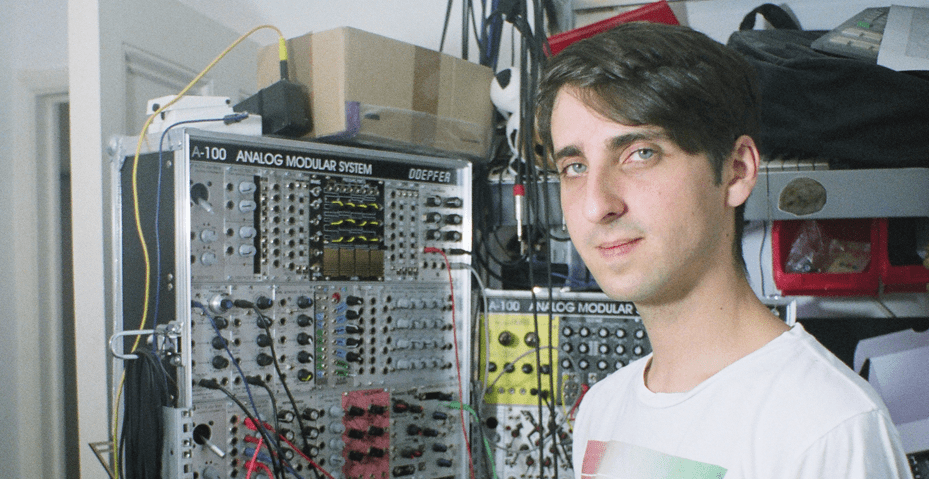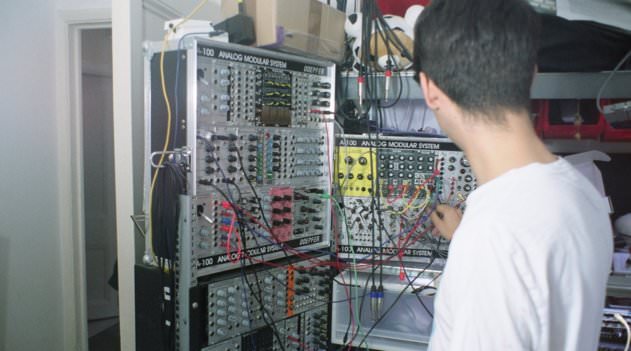And do you think of yourself as an electronic musician or just a musician who happens to use electronic instruments?
I think that distinction is dead. Sure, for old people, and rockist squares, and people who aren’t really into music it’s still a distinction, but amongst people who are engaged it’s not a distinction at all. Apart from when it’s Daft Punk’s stupid press angle to say that they don’t like laptops… Fuck off!
So was there time pressure on making music too over the last seven years?
Yeah. When you’re DJing you’re too dead on Monday and Tuesday to do anything really creative, then you’ve got to start preparing again on Thursday so there’s fuck all you can do if you’re DJing every week. Loads of things happened to the label as well, like our distributor, Amato, went bankrupt and the paperwork trail for something like that is immense. Then more recently the PIAS warehouse got burned down in the London riots and again the paperwork for that is insane. The government doesn’t give you any help with that, so you’ve got HMRC breathing down your neck for paperwork you haven’t received yet because someone else is in a crisis. It’s just running a business.
Did you think about that when you got into all of this?
No, not at all. You just assume that running a small business is going to be easy, because it should be. Small businesses are good businesses to work for. I’d much rather work for a small business than Tesco, but the way the economy is right now Tesco have it much easier than we do. That’s a bit depressing. But it’s also boring I suppose. HMRC are probably responsible for three months of the album delay or something, so… fuck ’em.
You can blame different people for different parts of the delay and then claim the album’s only taken you six months.
Yeah! There was probably about a year in the studio, a year sitting round smoking dope and playing Grand Theft Auto on my telephone, a year learning Max/MSP and the rest of the time was wasted by other people. [Laughs]
HMRC are probably responsible for three months of the album delay or something, so… fuck 'em.
Did you make the album in one go or dip in and out of it over the years?
I started it, then I got sucked into mixing the Kate Wax album. In doing that I learned how easy it is to finish an album and how something takes shape, how you decide what goes on it. That was the first time I’ve been involved in a big record being finished, so that made it easier in a sense. It kind of dragged on because she was very particular – that’s an understatement! – then after that it all happened in like six or seven months. In the end there were only about three tracks from those sessions that got left off. Basically everything I did in that time that I bothered to carry on with for more than half an afternoon ended up on the album.
[To photographer:] Do you want me to move some of my accounting paperwork off that Korg so you can see it properly?
I bet you left it like that on purpose! It’s a really crass, heavy-handed visual metaphor for the business overwhelming the music.
[Laughs] It really is, isn’t it?
When you started making the new album did you have a concept in mind? You said around the time of The Idiots Are Winning that the first album started out as an EP and kept growing.
Yeah, whereas with this one I knew I wanted to make… I don’t want to say a concept album but a thing, a whole world in a record. So I kind of had an idea of an aesthetic and it just kind of worked. The first track on the record is the first track I tried to write and it’s just bang on for the whole sound world. It’s a completely different way of working. With the first album although there were shitty drum machines and circuit-bent keyboards – which are all buried in this room now – still it was all edited and tightened up in the computer and all that shit. For this one everything was working as a live thing and then just got taped, basically. That’s kind of why it was so quick once I got going. In the old days, being a control freak, if something could have an automation curve I’d record it live but not render the audio so everything could still be re-arranged, whereas with this you just record it and that’s all you’ve got. It makes better music because it’s more real, but it also means you finish everything.
That big change in the process and the equipment is reflected in the sound of the album. It’s much less of a kick drum-based, dancefloor-focussed album than the first one.
I think being a DJ I got quite bored of kick drum-based music. It’s a real struggle for me to find stuff I actually want to play, but luckily I’ve got better and the people who come to my shows have gone along with me and I don’t have to play too much stuff that’s very kick-drummy or straight. DJing’s still quite fun because people are dancing along to kraut records now which makes me really happy.
I really didn’t want to make a dance album. I don’t really see the point in them. I always had this feeling like, ‘Why do I need a kick drum? I’m in my house.’ All the kick drums are at the back of the mix in everything. I don’t know if I can ever go back to putting kick drums in everything.
It’s quite a reaction against lots of the things I was exposed to in the dance music world. Everything’s so straight and so tight, and there’s this an arms race of personal weakness on the part of DJs and producers, like ‘If I make it 2dB more L3 on the master chain it’s going to be even louder and punchier. If I leave only a kick drum and an off-beat bass sound that’s going to be really loud…’ That’s like a race to the bottom. There’s so much imbued meaning in production choices and I think in dance music people are quite unaware of that, whereas with rock music you can produce it like Ariel Pink or you can produce it like Travis and people are aware of the meaning of that. There’s a continuum and where you put yourself on that determines what kind of band you are. Loads of people in dance music think that even though they’re not making Guetta-house they can use the same production techniques as Guetta and it’s still OK. To me that’s like… functional, spray-tan music.
There’s so much imbued meaning in production choices and I think in dance music people are quite unaware of that.
The meaning in that became really offensive, so I just wanted to do the exact opposite: make all the timing loose and the production soft and woolly and not sharp and tight. It’s still loud and intense and I’m still making an effort when I mix things down to make them sound good, but not that kind of good.



08.12 PM
Holden is a great producer! Nice words from him. And congratulations for the interview folks 😉 keep doing
12.37 AM
Too many quotables in this interview.
“But most of the people who tell me they’re producers don’t even think of the aesthetic of what they’re doing at all”
“Loads of people in dance music think that even though they’re not making Guetta-house they can use the same production techniques as Guetta and it’s still OK. To me that’s like… functional, spray-tan music.”
“it’s just like, what are the Berlin lot even doing now? What are you thinking? You’ve forgotten what it’s about!”
“I can just shit out a melody”
I don’t always love James’ music but he’s always interesting. You can really tell from this interview that he analyses everything he does, maybe too much, but that’s what being an artist’s about. Too many people only think about the money or making big crowds of idiots dance. Electronic music can be about so much more than that.
Going to check out the new album now.
12.37 AM
It’s good to be misunderstood! U only have to understand it yourself
11.56 AM
Im inspired to try and sh*t out some melodies later – it could get messy 😉
12.02 AM
Inspiring interview. I feel like a lot of people might not get Holden’s sense of humour and he sometimes comes across quite badly in interviews but this one really reveals a lot about him as a person and an artist. Refreshing to hear such honesty about running the label and the pressures to keep up the DJ appearances in order to make money. A quick look at the BC releases over the last few years and you can kind of guess which artists he might be referring to when he talks about that sense of entitlement.
01.26 PM
thanks so much for this. makes me want to rush home from work and make some music
02.50 PM
yeah, thanks a lot for letting us knowing bit more of james. it seems he also enjoyed it and thats the reason why the interwiew is soo good
03.57 PM
this is the case where intelligence makes a musician stand out.